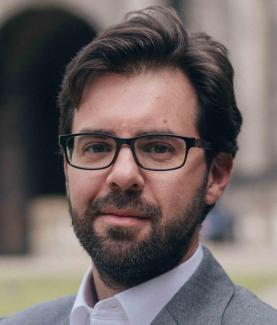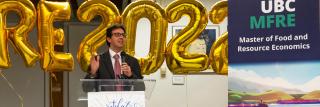Dr. Margulis contributes extensive professional and academic experience in international policy making to the MFRE.
In his course, Global Food and Resource Governance, Dr. Margulis develops students’ understanding of the international policy making process and equips them with essential tools for assessing the efficacy, fairness, and legitimacy of global policies and governance arrangements. To further explore the course and the subject of global food and resource governance, Dr. Margulis answered the following questions for us.
How were you introduced to the world of global food and resource governance?
Dr. Margulis was introduced to the world of global food and resource governance as a member of Canada’s negotiating team to the World Trade Organization (WTO) in food and agriculture, where he was responsible for negotiating international trade liberalization on agricultural products. “Through that experience I really got to understand the complexities of international trade negotiations and the sensitivities that countries have when it comes to their agricultural markets.” The experience also familiarized him with the implications that international trade negotiations have for domestic policy back in Canada. “WTO rules apply not just to trade at the border but to domestic policy around food and agriculture as well – everything from farm insurance to the Canadian supply management system. All of these policies are a part of multilateral negotiations, so you can’t really think about agricultural markets without these global rules that enable them to function.” His time at the WTO motivated Dr. Margulis to pursue a PhD focused on issues in global food policy, specifically international trade liberalization and food security.

What attracted you to the program and this teaching opportunity?
Dr. Margulis currently teaches the Global Food and Resource Governance course in the MFRE program, which is organized around the examination of real-world controversies in global food and resource governance, including global food crises, large-scale land acquisitions, and the agriculture negotiations at the WTO. He was drawn to MFRE both by its relevance to his research and its applied dimensions. “The idea of working with professional master’s students who want to go on to work on these issues – not just study them abstractly or theoretically – really attracted me to teaching in the program.” The course is delivered in a seminar-style format that fosters open discussion and develops students’ ability to scrutinize and communicate key challenges in international governance. “It gives students an opportunity to look at issues in a slightly different way and develop other types of transferable employment skills that will help them. Of course, they are getting rigorous econometric training throughout the program, but a course like this allows them to deal with real-world policy issues as well. For example, we’ll be looking a lot at the effects of the Russian invasion of Ukraine and what that’s done to global food markets and global food insecurity. There is always an opportunity to look at current issues as they unfold and I think that’s a real service to the students.”
How can a course like this and your relevant experience bring value to students as they prepare for their careers?
“Something I always tell my students is that no matter where you end up working – whether it’s the private food sector, financial analysis, market analysis, or research – if you lack an understanding and appreciation of the global dynamics and rules that govern food production and trade, you really can’t do your job – you lack the context and you’re flying blind.” That context is exactly what Dr. Margulis wants to give students in order to familiarize them with the depth and complexity of the issues facing the food sector. “I try to ensure that students who take my course leave with an appreciation for this, so that when there is a major shock or crisis, they can say, ‘OK, I understand why this is happening and what the implications are for me and the firm/sector I work in’ and be able to navigate some of the challenges and opportunities that come up as a result.”
About Dr. Matias Margulis
Matias Margulis is an Assistant Professor in the School of Public Policy and Global Affairs and Faculty of Land and Food Systems at the University of British Columbia. His research and teaching interests are in global governance, development, human rights, international law, and food policy. In addition to his academic research, Matias has extensive professional experience in the field of international policymaking and is a former Canadian representative to the World Trade Organization (WTO), Organization for Economic Cooperation and Development (OECD), and UN Food and Agriculture Organization (FAO)
